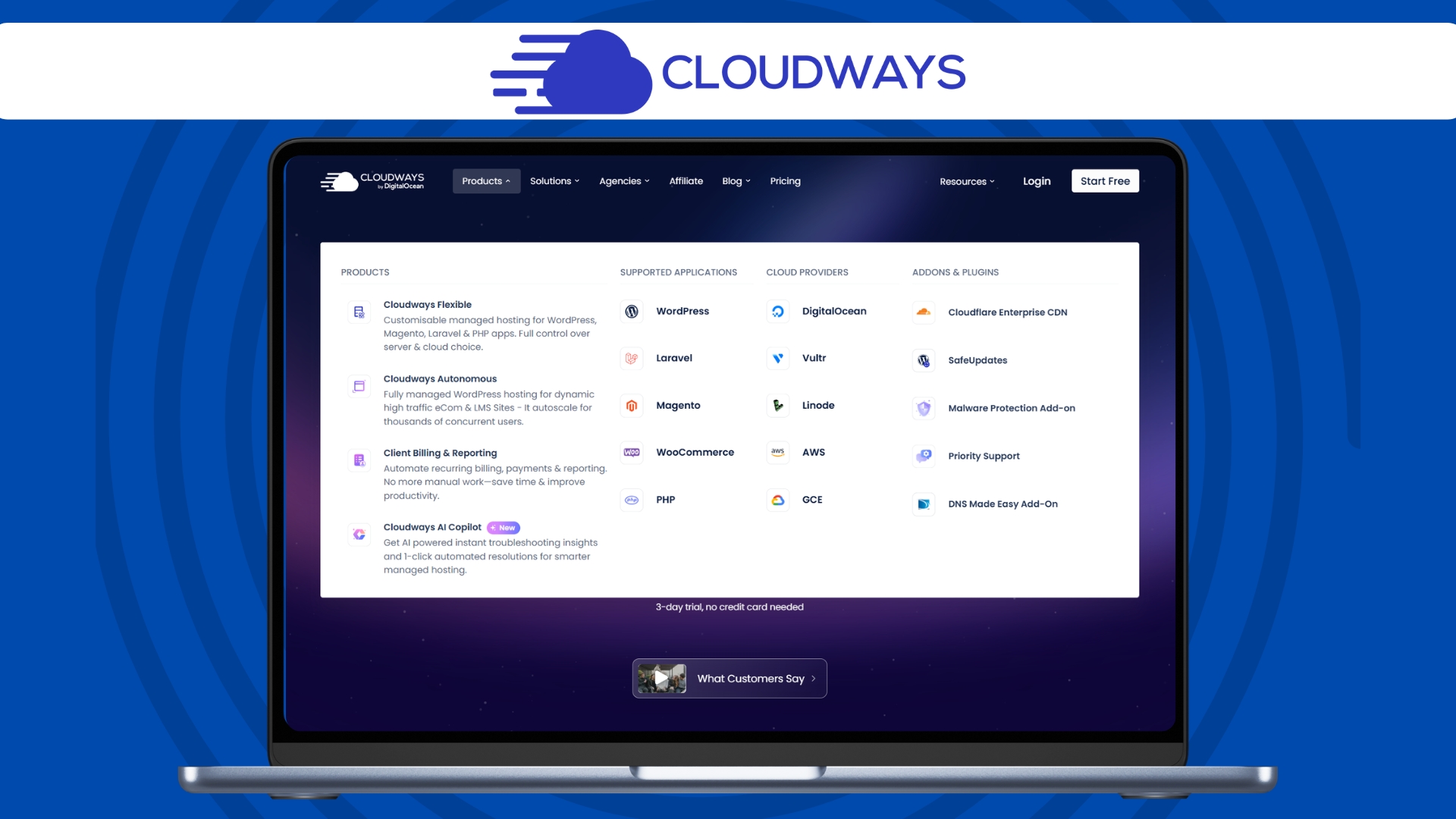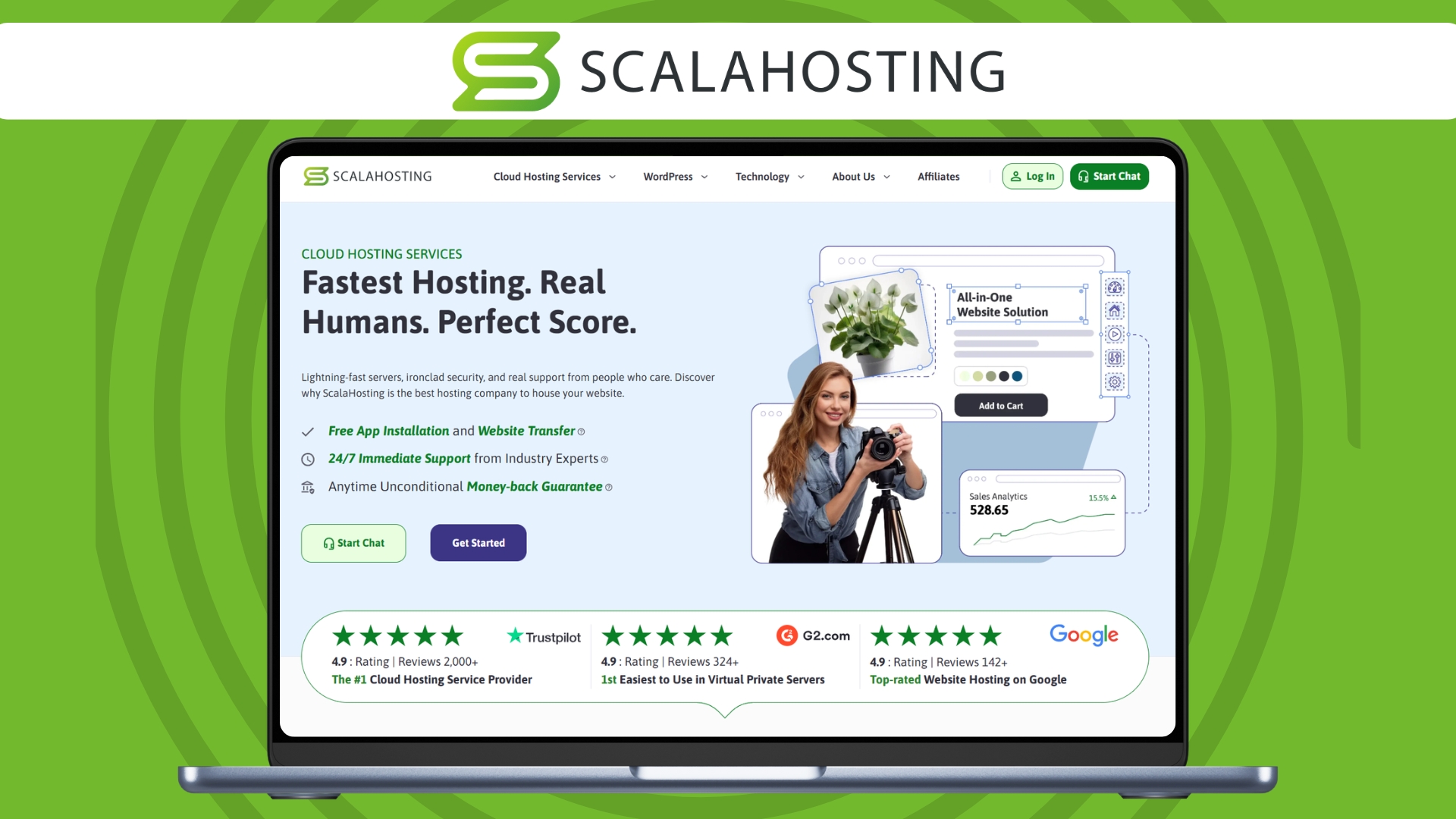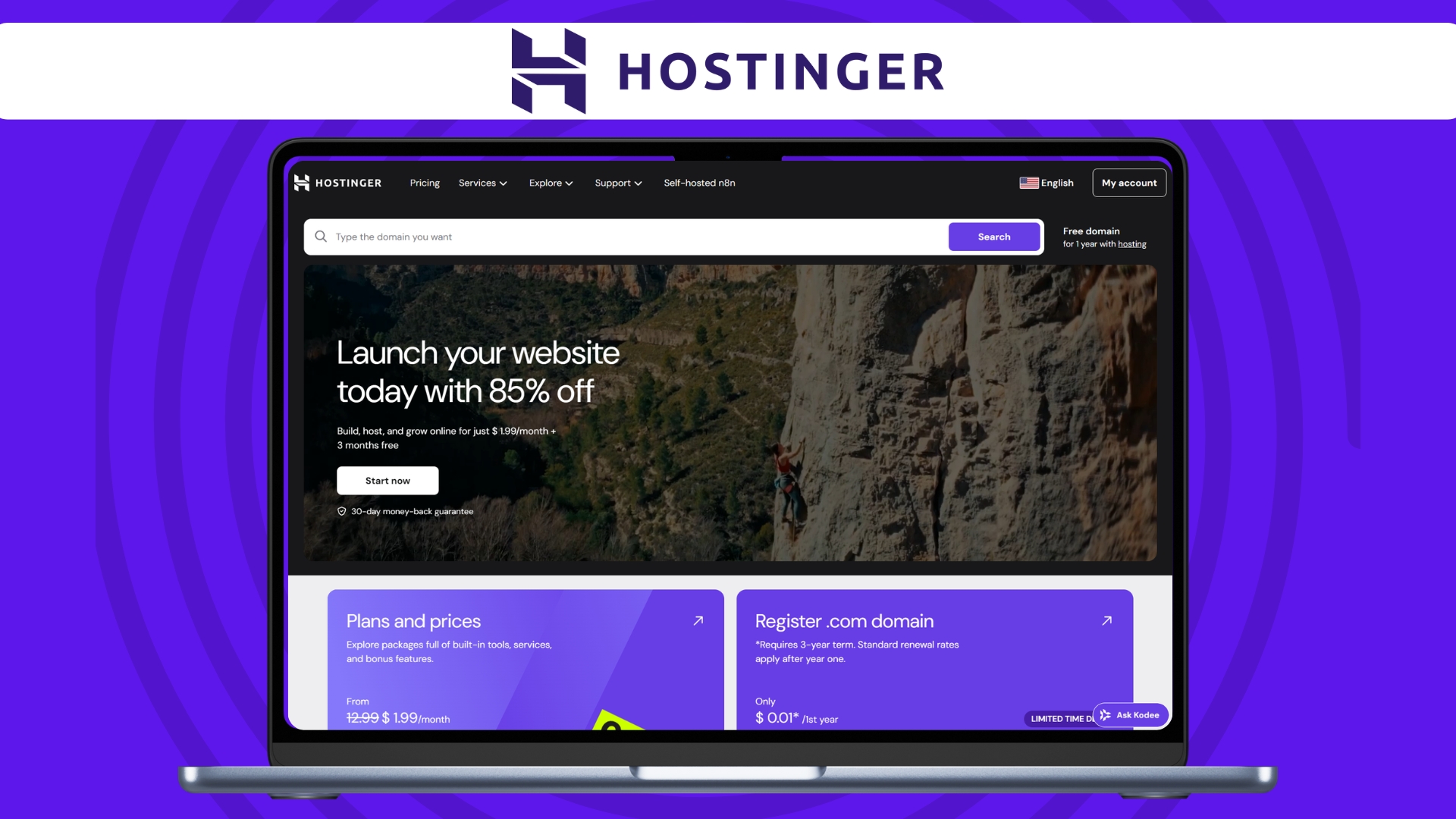Best cloud hosting providers of 2026
The best cloud hosting services make it simple and easy to host your website with redundancy and flexibility

Sign up for breaking news, reviews, opinion, top tech deals, and more.
You are now subscribed
Your newsletter sign-up was successful
Cloud hosting is one of the best web hosting types for reliability and power. It is especially suitable for the best ecommerce hosting. Cloud hosting can be more expensive and isn't a requirement for everyone. Small and simple websites that are not affected by small amounts of downtime would find better value for money with the best shared hosting or best VPS hosting packages.
The best cloud hosting providers of 2026
Best cloud hosting overall
Liquid web
Specifications
Reasons to buy
Reasons to avoid
Founded in 1997, Liquid Web is a top choice for businesses that want high-quality fully managed cloud hosting across VPS, WordPress, dedicated, Magento, and WooCommerce products.
Liquid Web’s Cloud VPS plans start so low that just about every small business that wants to benefit from cloud infrastructure can join. At $5/month, it offers 1 vCPU, 1 GB RAM, and 30 GB SSD storage—and depending on your needs, you can go as high as 8 vCPU, 32 GB RAM, and 640 GB SSD.
All plans support auto scaling, a key feature of cloud hosting, that allocates resources based on real-time demands and workloads. This way, you only pay for the resources you use, ultimately saving you money.
Liquid Web’s autoscaling works by constantly monitoring your website and the traffic it receives. If/when the incoming traffic begins to exceed concurrent capacity, the service automatically scales your resources, thereby avoiding site slowdowns, crashes, and potential customers abandoning your website.
There’s also protection from DDoS attacks and cloud backups but you’ll have to spend extra for those. This is unlike its managed VPS hosting where every single plan comes with 10 TB bandwidth, 50 GB cyber backups, CloudFlare CDN, and excellent security offerings, such as an integrated firewall, protection from DDoS attacks, and a dedicated IP address.
Then there are dedicated cloud servers that combine the benefits of a dedicated server and the flexibility of cloud hosting. The plans in this tier are not cheap but they're tailor-made for enterprise-grade businesses—even the most basic plan comes with 6 cores, 16 GB RAM, 480 GB SSD, and 10 TB bandwidth. Also, you get instant provisioning and an integrated load balance and firewall.
Liquid Web offer a 100% uptime guarantee and Liquid Web’s Service Level Agreement states that you’ll get credits if it doesn’t deliver on its promises. This is true for both hardware and network services, making Liquid Web one of the most reliable cloud hosting providers I’ve seen.
One of the highlights of the service is its prompt customer support—24/7/365 availability. Moreover, they have a 59-second initial response time on phone support and live chat and 59 minutes when you contact them through their helpdesk.
Best cloud hosting for ecommerce
ScalaHosting
Reasons to buy
Reasons to avoid
ScalaHosting’s cloud range stands out, first and foremost, for configurability. You can create a custom cloud VPS with as much as 24 CPU cores, 64 GB RAM, and 2,000 GB storage. Obviously this level is resources is not for everyone and ScalaHosting can help you select the right amount of resources for you. If you need more? No bother, just add more without downtime thanks to the cloud infrastructure.
Pricing-wise, ScalaHosting presents a solid proposition—the starter plan Build #1 comes with 2 CPU cores, 4 GB RAM, and 50 GB NVMe SSD storage (which delivers up to 10x faster website speed than standard SATA SSDs), plus automatic offsite backups and unmetered bandwidth for a reasonable $29.95/month (12-month plan). Regardless of the plan you choose (there’s a total of four of them), you get CloudFlare CDN and protection from brute-force attacks built-in.
For example, under Site Popularity in the custom builder, you can enter your daily number of website visits and it will automatically suggest a configuration that is ideal for your site. This, combined with self-managed VPS hosting and the ability to scale up and down with a single click, makes ScalaHosting suitable for virtually every single business and expertise level, regardless of size.
An interesting ScalaHosting offering is its custom control panel known as SPanel which might interest customers who want more control in managing their web space. It’s arguably more secure (real-time malware protection), more lightweight (can run on a VPS with less than 1GB RAM), and feature-packed than the industry-standard cPanel. There is a terminal directly integrated into the panel and support is integrated too.
The panel is democratized and users can submit what features they want to have and vote on each other's suggestions. SPanel comes as standard with all ScalaHosting VPS plans, whereas cPanel demands an extra investment—it starts at $26.95 for 5 accounts, and the price increases as you add more websites. On the other hand, SPanel allows you to host unlimited accounts and websites at no additional cost. SPanel is available for hosting plans not with ScalaHosting too
I also like that ScalaHosting offers free site migrations, unlike other big-name providers. Migrations can be a pain, especially if you’re a small business without a core tech team. But with ScalaHosting’s skilled technicians, all you have to do is give them your login details to the old hosting service. Moreover, even if you decide to switch back, Scala’s experts will help you with that, too.
Speaking of switching back, ScalaHosting is one of the few providers I’ve seen that offer anytime unconditional money-back guarantee (30 days) and promises prorated refunds should you choose to cancel midway through your plan. So, if you pay for two years and cancel after a year, you’ll be refunded 50% of your original payment.
SiteGround

Reasons to buy
Reasons to avoid
If you have a smaller business, that's too large for shared hosting and VPS is not suitable for you, SiteGround offer cloud hosting but packaged neatly in more affordable packages. For example, the GrowBig plan looks like a standard web hosting package but because it's on cloud infrastructure you get the added bonus of geo-redundancy, with backups stored in a different location. You can also host one website from one account in multiple data centers around the globe. The plan is shared and managed so should your site or other sites need more resources SiteGround will add them when required. If your site has some complex requirements then SiteGround may not be able to configure the server for you so it's best to check with support if you have anything other than a standard WordPress or wooCommerce site.
Security-wise there's not a fault to be found, as Google Cloud’s data centers enjoy multi-layered security. This includes limiting the server room’s access to certified employees, 24/7 availability of security teams, and SiteGround's geo-distributed daily backup system and in-house monitoring that checks server status every half a second. I also rate SiteGround’s built-in CDN network very highly, as it can significantly boost (5x) your website’s speeds by caching your site content on 15+ CDN locations.
SiteGround also have fully cloud plans that mean business. Its entry-level cloud hosting plan starts at a whopping $100/month and comes with 4 CPU cores, 8 GB memory, and 40 GB SSD storage—that’s more than enough for most SMBs.
In the cloud plans, SiteGround give you two options for scaling—you can add CPU and or RAM at any time with a click or use an auto-scaling option. The latter automatically adds more resources during unexpected jumps in traffic, making it preferable for large businesses with multiple websites.
One of SiteGround’s major selling points is that its data centers are part of the green Google Cloud infrastructure, meaning it's an environment-friendly cloud hosting service.
Google is, first and foremost, carbon-neutral. Secondly, it matches all electricity consumed by its servers and offices with energy generated from renewable sources, including wind and solar.
DreamHost
Reasons to buy
Reasons to avoid
DreamHost offers its cloud computing service under a product it calls DreamCompute, which is very versatile, as you can use it to host websites with the software of your choice, run your own MySQL server, for gaming, or as a Plex Media Server—the flexibility is brilliant.
The company itself is vastly experienced, being established in 1997. At the time of writing, it has hosted over 1.5 million websites, serving 400k+ customers—and throw in its 24/7/365 customer service and you can see why it's a highly popular hosting provider across the board, whether that's shared, VPS, managed, dedicated, or cloud hosting.
Now, about its cloud hosting wing, DreamHost is right up there with IONOS as the cheapest. You can get started with DreamCompute at just $0.0075 per hour where you get 512MB RAM, 1 vCPU, free bandwidth, and 80 GB SSD storage.
Like IONOS, there's a maximum monthly price here, too. For example, for the above-mentioned plan, the max monthly price is $4.50 (with IONOS, it’s $4.00), which is just 600 hours (or 25 days). So, you're essentially getting 120 hours (5 days) of service free every single month.
Not only that, but all DreamHost accounts also come with 100 GB of block storage at no additional cost. You can, of course, get extra storage, but that too, is super cheap—just $10 for every 100 GB chunk. Storage-wise (both SSD and block), DreamHost is better than IONOS, which is why it’s my top choice for small businesses.
Also, DreamCompute is much cheaper (more than twice as cheap) as, say, OVHcloud, another pay-per-hour cloud hosting provider. OVHcloud's entry-level plan with 2 vCPU, 7 GB RAM, and 50GB storage is $0.184/hour, whereas DreamHost provides 4v CPU, 8 GB RAM, and 80 GB storage for just $0.08/hour.
A highlight of the service is auto-scaling. You can change your server automatically using OpenStack-compatible API requests. DreamHost is also lightning-fast, allowing you to go live in 30 seconds or less. This is made possible with its smart architecture that's based on fast SSD disks, next-gen processors, and accelerated networks. Plus, its entire infrastructure is open-source, which, security-wise, is a huge plus.
What DreamHost is not is ideal for really expansive and large enterprises. It caps out at 8 vCPU and 16GB RAM, whereas almost every other provider on my list has high ceilings. For instance, ScalaHosting’s custom cloud VPS can provide 24 CPU cores, 64 GB RAM, and 2,000 GB storage.
Best cloud hosting for medium sized businesses
Specifications
Reasons to buy
Reasons to avoid
In the latest updates from Hostinger the company rolled out support for geo-redundancy and auto-scaling across the cloud hosting products. This makes it one of the best value cloud hosting solutions for medium sized businesses.
Other cloud hosting plans at this level use cloud infrastructure but don't always pass the benefits of cloud on to customers. Instead, traditional hosting plans are packaged on cloud servers with the limitations of traditional architecture and are cloud only in name.
Hostinger have three cloud plans. Cloud Startup, Cloud Professional, and Cloud Enterprise. The plans range from supporting 200K monthly visits as standard up to 400K on the highest level plan. Each plan only supports 100 websites which could be a restriction for some resellers.
As usual with Hostinger, you get a bunch of free features will all plans. Websites with global visitors will benefit from the included CDN and new site owners will benefit from the free domain name with a value of up to $9.99 for the first year.
Technical specifications include 100 to 300 PHP workers, 2,000,000 to 4,000,000 inodes (with a limit to 800 databases for each plan), 300 sub domains, and 100 to 150 MySQL max user connections. An unlimited amount of FTP accounts and cronjobs are also a feature across all plans.
For website creation the AI website builder is included and a drag-and-drop website builder together with 150 templates designed by professionals. For WordPress there are WordPress AI tools, a staging tool, smart auto updates, one click installers, plus WP-CLI and SSH.
All-in-all this is a very capable cloud hosting provider suitable for medium sized businesses that don't require the top level of cloud performance packages but still require the reliability and flexibility of cloud hosting at the lower end of the budget.
InMotion Hosting

Reasons to buy
Reasons to avoid
InMotion Hosting was founded in 2001 and provides a comprehensive cloud hosting service for Linux OS, including CentOS, Ubuntu, Alma, or Debian that is affordable and can also cater to full-fledged enterprises, thanks to premium-level feature-packed plans.
It's worth noting that InMotion Hosting's cloud VPS is Linux-only. Other solutions, such as bare-metal (dedicated) servers, support multiple OS options.
Unlike other providers, InMotion Hosting makes a clear-cut distinction between standard SSD and fast NVMe SSD plans—the latter costs a little bit more but is undoubtedly a better choice if you’re after blazing speeds.
Prices for InMotion Hosting start at $6/month for which you get 1 GB RAM, 1 vCPU, 30 GB standard SSD storage, and 2 TB bandwidth. The same specifications with 30 GB NVMe SSD storage costs $7/month. The plans come with live-state and scheduled server snapshots for easy rollbacks, enterprise-grade fiber optics for fast data transfer, and security features like dedicated IP address and DDoS protection.
InMotion is also my top choice for businesses that want to pay on a month-to-month basis and not have the hassle of worrying about price increases on renewal. This is because its prices remain constant regardless of whether you pick the annual or monthly subscription—and the 30-day money-back guarantee is the perfect cherry on top.
What's even better (and surprising) is that the 30-day money-back guarantee is even available to those who go forward with a monthly plan. That said, if you’re convinced of its service and want to stay long-term, I recommend getting in touch with a customer support agent who should be able to get you a decent discount on the yearly plan.
What's more, customer support is also top-notch. You get 5 ways to get your questions answered, including 24/7/365 phone support, email, live chat, online tutorials, and community-based Q&A.
OVHcloud
Specifications
Reasons to buy
Reasons to avoid
OVHcloud is a French company that was founded in 1999 and now delivers shared hosting, public and private cloud products, and dedicated server solutions in 140 countries worldwide, making it one of Europe’s leading cloud providers. Also, it boasts around 32 world-class data centers along with multiple points of presence (PoPs), so irrespective of where your visitors are from, OVHcloud will provide performance.
The provider offers two cloud products—public and private. The latter is designed for large enterprises that want dedicated infrastructure on isolated servers + the benefits of cloud. So, OVHcloud’s Public Cloud, which comes with a 99.999% SLA and ISO/IEC 27001, 27017, 27018 and 27701 certifications, is where the party's at for most businesses and websites.
Right off the bat, I liked the sheer number of options it offers. There are as many as 9 broad filters, including storage, network, databases, data analytics, etc., and then several subdivisions inside each of them, allowing you to zero in on the perfect plan for your business’s needs.
This makes OVHcloud great for niche businesses. For example, for eSports and online gaming businesses, it comes with dedicated game servers and specially designed machines that help them provide optimal gaming performance to their customers, including minimal latency and DDoS protection.
Then it also offers machine learning, deep learning, and big data solutions—something I've seen very few providers do—where its on-demand scalable resources and storage capacity serve as the perfect solution for AI and data-driven businesses.
Also, if you want to steer clear of the extreme customization, you can do that too—just stick to the General Purpose plans that are suited to all needs. No matter the plan you pick, you will get a generous $200 credit so that you can test OVHcloud’s services risk-free.
Speaking of pricing, one of OVHcloud’s standout offerings is its pay-per-hour model. Prices for its Public Cloud plans start at $0.184/hour which fetches you 2 vCPU, 7 GB RAM, 50 GB SSD, and a public network speed of 250 Mbps guaranteed. Of course, you can also choose to pay on a monthly basis, where the aforementioned plan will cost you $65.60.
OVHcloud is admittedly not a small business-first cloud hosting service, considering its prices, but that’s where its web hosting plans come in—it’s hands down the cheapest web hosting provider with plans starting as low as $1.04 per month.
While these plans are not out-and-out cloud, you still get scalability, as you can migrate from one solution to another as your needs change. Plus, given that there are a total of 7 configurations to choose from, there’s enough flexibility, too.
Cloudways

Specifications
Reasons to buy
Reasons to avoid
Cloudways is an out-and-out cloud hosting service, serving over 100K agencies, SMBs, and individuals worldwide. It partnered with DigitalOcean in August 2022 and now offers true cloud benefits, excellent security, easy management, and robust support for multisite, ecommerce, and SMB hosting, among others.
Cloudways is the only hosting service on my list that gives users an option between 3 top cloud providers—Amazon Web Services (AWS), Google Cloud, and DigitalOcean (Cloudways’s native service). There are lots of plans to choose from across the three providers (and you can also pay by the hour), so you can pick what best fits your budget and need for resources.
All plans come with auto-healing (any issues are resolved automatically and promptly), optimized caching, hourly automated backups, DDoS mitigation, Free SSL, regular security patches, a vulnerability scanner, etc. You can also switch PHP versions (7.4, 8.1, and 8.2) at the server level with a single click.
However, it’s worth noting that storage on both AWS and Google Cloud is capped at 20 GB no matter the plan you pick, so if you need disk space of, say, 50 GB or more (up to 1,280 GB), then DigitalOcean is a no-brainer pick. But again, AWS and Google Cloud have a lot more data centers than DigitalOcean.
Cloudways is a top choice for businesses that want to host and manage multiple WordPress websites with hundreds of concurrent users. Not only do you get the above-mentioned catalog of features, but also unlimited website installations and team management features.
The company has joined hands with Cloudflare Enterprise to offer free CDN and DDoS protection—and you get a no-nonsense, easy-to-use dashboard for real-time control over your website performance. In addition to free website migrations, the uptime’s decent at 99.99% and with 400-600 ms loading speeds, you can rest assured that your websites will be up and running at all times.
Now, what I really like about Cloudways is its auto-scaling. It’s available as part of its Cloudways Autonomous product which has separate pricing and harnesses the power of Kubernetes and its cutting-edge infrastructure for top-notch scalability and reliability. There are 7 plans to choose from here, ranging from $35-$1,640/month, 15-200 GB disk space, 30-1,500K unique visits, and 100-3,000 GB bandwidth.
What’s even better is that the provider explicitly mentions the cost of auto-scaling. It’s $1 each for every 10 GB of additional bandwidth, 1,000 extra visits, and 1 GB of added disk space. This is excellent since most providers don’t offer auto-scaling and/or aren’t clear about its true cost.
Cloud hosting FAQs
Why use cloud hosting?
With non-cloud packages, if something goes wrong (usually when, not if) it can cause downtime. For example, if a CPU or storage device becomes faulty, it will need to be switched out often taking your website offline. While this is unlikely, if you have a large business, it can still cause significant loss.
Cloud hosting provides increased reliability and resilience because resources are spread across multiple machines. This means your website is not reliant on a single server. Additionally, it makes it much easier to scale resources, as this does not require physical hardware changes.
How to choose the best cloud hosting providers for you?
Before anything else, look for a provider with scalable resources, as that will allow you to easily upgrade or downgrade your hosting plan, meaning you can meet unexpected spikes in website visitors and prevent slowdowns & crashes.
Auto-scaling, where everything is hands-off, like in Liquid Web and SiteGround, is undoubtedly preferable, but you can also go for providers that offer seamless one-click scaling.
Next, the cloud hosting service you pick should offer geo-redundancy, which is the ultimate hallmark of reliability. This implies that your website’s resources and backups are distributed across multiple data centers around the world so that your website is up and running at all times, even when a particular server is facing downtime or is under maintenance.
Speaking of downtimes, I recommend prioritizing cloud hosting services that offer a 99.99% uptime or more—Liquid Web and OVHcloud lead the way with 99.999% uptime.
One of the most important considerations is the level of security offered by the provider. Ensure your chosen service comes with free SSL certificates, DDoS protection, dedicated IP address, firewalls, antivirus and anti-spam measures, regular backups (some providers even offer hourly backups), and more.
As is the case with every purchase, your budget is going to be crucial. The key is to match your budget with the amount of resources you need. Also, consider the cost of auto-scaling and/or moving on to a higher-end plan, as that will certainly become a factor once your business grows.
The amount you'll have to shell out will depend, to a great extent, on your business’s size and demands. For instance, if you're an individual blogger who wants to host a single website, cost-effective entry-level plans that will cost you around $5-30 will serve you well.
However, if you're a growing or full-fledged business with lots of websites and visitors, you need to invest hundreds of dollars to acquire a comprehensive package of features, security, and, of course, cloud benefits. Speaking of cloud benefits, you can also go for green cloud hosts such as SiteGround which are carbon-neutral.
Last but not least, customer support should be top-notch. Most providers on my list offer 24/7/365 availability, as well as an in-depth knowledge hub with tons of helpful guides so that any issues you may run into are resolved quickly. Plus, it’s always a good idea to sign up for a provider that offers a free trial and/or money-back guarantee, allowing you to try out the service without risking a single penny.
How we test the best cloud hosting services
TechRadar’s in-house team of experts tests every single cloud hosting provider across core aspects, such as features, performance, ease of use, customer support, and value.
We begin at the provider’s website where we look at the range of resources, plans, and types of cloud hosting it offers and whether that’s enough to cover the needs of various users.
We don't take a provider at its face value, looking beyond its marketing blurb and getting hands-on with its services. While we're at it, we evaluate its real-world performance by uploading a basic static site to our web space, including HTML and CSS files and even some images. Then we use Uptime.com and GTmetrix to test the availability and server response time of our site at five-minute intervals.
We understand the pain of picking a product that's not right for you, which is why we make sure we test the cloud hosting service thoroughly. For this, we check if the company presents its products in an honest, clear, and transparent way or if it makes over-the-top promises.
For instance, many low-ranking providers mention scalability and reliability as a benefit of their “cloud” services without offering automatic or one-click scaling and geo-redundancy—these are the most important benefits of cloud hosting and we've ensured every provider on our list offers them.
To conclude how value-for-money a particular cloud hosting service is, we compare it with its competitors side-by-side, checking their plans’ features and price points.
Lastly, we explore the provider’s ease of use and customer support. Does it have enough high-quality troubleshooting guides? Are they easy to find? What methods can be used to reach the support agents? And when we throw a test question their way, how quickly does it take to get a reply, and is it a complete and accurate answer?
It's important that we find the answers to all of these questions—and that the answers are positive—because you'll more than likely run into trouble in some areas.
For more info on our testing process, check out TechRadar’s how we test web hosts page.
What is the cloud?
The cloud is characterised by what it provides more so than what it is. A cloud service should provide scalability without downtime and redundancy. These two terms essentially mean always available causing the phrase cloud to become a marketing term to advertise higher-level plans.
Web hosts and other services will put cloud in the name of their products to try and signify that the service is very powerful but in this sense the term cloud is meaningless.
If you need a cloud service for availability, then just choosing a plan with cloud in the name might not give you want you need. You need to check to see whether the features genuinely provide the benefits a cloud architecture gives you.
The authors

Lewis has over two decades of experience in web and software development for high growth businesses and has maintained critical infrastructure for dozens of banks across the UK, handling millions of transactions daily. He is currently principal cloud architect for AI startup, Carbonate, and has a passion for anything hosting or tech related. When not getting carried away by the latest project he’s helping TechRadar test web hosting services.
Sign up to the TechRadar Pro newsletter to get all the top news, opinion, features and guidance your business needs to succeed!

James is a tech journalist covering interconnectivity and digital infrastructure as the web hosting editor at TechRadar Pro. James stays up to date with the latest web and internet trends by attending data center summits, WordPress conferences, and mingling with software and web developers. At TechRadar Pro, James is responsible for ensuring web hosting pages are as relevant and as helpful to readers as possible and is also looking for the best deals and coupon codes for web hosting.




